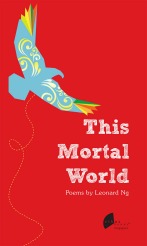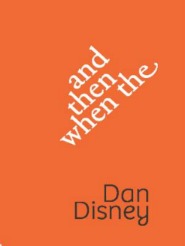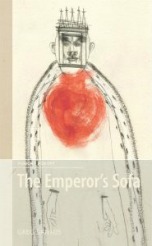|
by Pauline Burton
  
Leonard Ng, This Mortal World, poems by Leonard Ng, Ethos Books, 2011. 83 pgs.
Dan Disney, and then when the, John Leonard Press, 2011. 60 pgs.
Greg Santos, The Emperor's Sofa, DC Books, 2010. 85 pgs.
This Mortal World In This Mortal World, Leonard Ng creates a cosmos in which different realities meet, and the perception of beauty as something fragile and easily destroyed is never far away. This is a watercolour world: delicate brushstrokes and layers of metaphor depict animals, friends, seasons, cityscapes (especially in Ng's native Singapore), travel, love and loss. Water is a recurring image throughout the collection: in ponds, canals and rivers; water dripping from melting ice and water falling as precipitation—we read of rain as a "descended god," "great waves of rain, "a spray of droplets," "weary rain," "dancing raindrops." These water images culminate in the tropical downpour of the concluding poem, which drenches the poet and his fellow teachers, much to their delight, so that "our work clothes, like our souls, were like school uniforms/growing wet and transparent in the rain." Fish glide and leap into several poems: a suckerfish in a tiled pond is compared to a mendicant Taoist monk and koi are seen "drifting idly by/in the mottled green light of their heaven:/these buddhas of water, knowing nothing but now." The poet's persona also encounters a variety of numinous beasts: he meditates on a "stand-off" with a hawk in America, seen as an "imperious abbot"; describes an eagle in flight as an "angel-shape" and most original of all, imagines a love-affair in England hexed by an urban fox, "a fine gangster's lady, in her crimson overcoat." Moths, both real and symbolic, are also linked with mortality, as "they linger suspended, eerie angels/light as ash in air" next to a war memorial at night. This is an accessible, engaging collection, employing a variety of poetic forms. The traditional sonnet is, maybe, too rigid a form for Ng's free-flowing style; dance rhythms, however, are successfully used in several works, and non-Western modes such as the ghazal and a deftly-handled haiku sequence make a welcome appearance. The book as a whole could, perhaps, have benefited from some paring down. Ng's voice is at its most impressive, for this reader, in the simplicity and directness of pieces such as "Four Poems from the Himalayas" and "Drinking tea alone during incessant rain" in which these lines appear: "Three things, I'm sure, will linger in my mind:/the taste of tea, the sound of rain, the smell of fish frying." This is Ng's first full-length collection, and hopefully more will follow. and then when the The title of Dan Disney's collection—and then when the—gives some indication of the dynamics of his verse: the musings of a mind in flight. A recurring theme of these dazzling, sometimes elliptical poems is the nature of reality, flagged up in references to an eclectic range of sources, from Wallace Stevens to the Buddha, via Umberto Eco, Wittgenstein and Hesse. The collection is bookended by two portraits (maybe) of the writer himself, as a philosophy student ("Standing among the philosophy class") and as a poet ("Poets"). In the opening poem, the writer positions himself with others who share the same quest—"we come/fog-breathed/to hear how we might come to know the world through pure reflection/without recourse/to experience" yet the hopelessness of this undertaking is shown by the vivid materiality of the poem, as in the detail of "fog-breathed." These seekers after truth have come in from the rain outside, where "The trees/are wearing the shape of trees," into a chilly lecture theatre, "A huddle of minds/in the dark morning." There is humour here, certainly, yet sadness too: sadness (and verbal wit) which is echoed in the concluding "Poets"—"non-descript as our job descriptions and/making memos to the immemorial." Dan Disney takes the reader on a rollercoaster ride of keen observation, metaphysical speculation, riffs on themes and quotations from Western writers and artists and surreal juxtapositions of the past and the present, the sublime and the absurd. The book's epigraph, Sartre's "how strongly things exist today," is fully realised—"you really do gotta love Reality," Disney wryly comments. This love is apparent in his precisely worded evocations of place, as in a road trip along Australia's Great Dividing Range: "The sky is starling-filled granite, this open country/veneered with estates sudden as dark water rising…" Human life is rooted in this landscape: "A bus draws in to school, freckled generations/at its windows. Up the road, the cemetery/is carved with phonebook names." Do we really gotta love Dan Disney's re-workings of Western cultural icons? I would say "yes": spotting the allusions and enjoying the fun he has with them is one of the book's chief pleasures. I laughed out loud at the image of a shouting worm in the beak of an inter-textual blackbird, reversing the Wallace Stevens quotation into "metaphor/is a cliché from which we escape by reality"—the worm that turned indeed. Darker existential themes also appear: the nightmare of escaping from a wooden box, only to find oneself within another box, then another and the Darwinian struggle for survival through the whole chain of being as "A thing, eating a thing/becomes eaten by another thing." I look forward to more from this writer and hope ("after Dan Disney") that "the well-born" [Hong Kong/pick your own city] "heigh-ho masses, amid velvety fumes/in short black everything" will rush out and buy the book. The Emperor's Sofa "Wow!" is my reaction to Greg Santos' three-part collection, The Emperor's Sofa. Originality raises its ornery head in every piece, and yet somehow the whole is more than the sum of its parts. Santos pays tribute to various modern North American poets and shares several traits with members of that illustrious tribe: snapping wit, irony, urban angst, the rhythms of everyday speech (with a slight Canadian accent) and a mordant relish in the trappings of consumerism: "Someday AbRollers and ThighMasters/will collect dust in gym-equipment graveyards,/some still whirring, clanking/and screeching for someone to oil their joints." The mundane becomes unsettlingly strange, seen from Santos's perspective. Nothing is impossible: pandas prompt a new age religion; the poet morphs into a musician in a Rousseau painting; the Incredible Hulk is in love with Shelley and sofas of various kinds fly by like birds. In "Picnic by the Sea," the end of the world is a fiery counterpoint to a tender love poem, addressed to the poet's wife. In "The Window," the inanimate comes to life in a dream sequence, ending with a pun: "The street remembers/to look both ways before crossing itself." Santos is a beguiling storyteller. We laugh at the opera-singing squirrel, hurling peanut shells after a failed audition, and gasp as the beast is deconstructed a couple of pages later, in "My Mecha Squirrel Runs On Batteries, Not Acorns." Elsewhere, two old guys reminisce about the good old days (with pterodactyls); a giraffe licks the poet's roof; an astronaut quarrels with his robot about Robert Frost. As for the Emperor—who rules in several poems—he is chillingly reminiscent of many dictators, past and present, and is by implication the destroyer in the poem "Man and Woman": "The camels are gnawing/not on leather/but a shriveled hand/severed at the wrist." With Santos, wit is a serious business. Three very different poets, all well worth reading, and each with different pleasures to offer. In particular, I would love to hear Santos read aloud. Meanwhile, he can speak for all poets: "Knowing you are out there reading me/Makes me feel like dancing." |